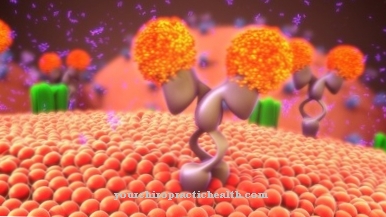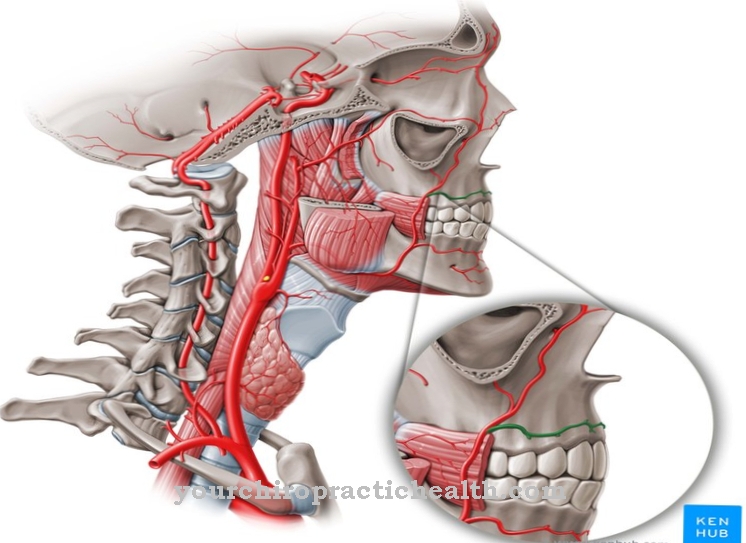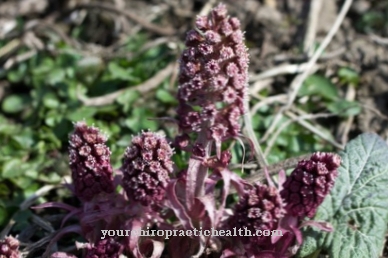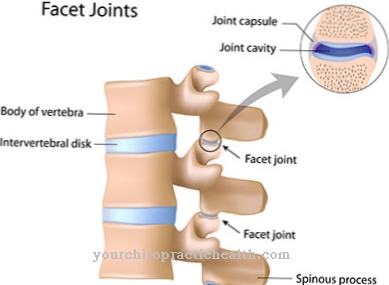Nasal polyps are pathological changes in the mucous membranes of the paranasal sinuses. If treated early, control is usually successful.
What are nasal polyps?

Nasal polyps are benign tumors or growths of the mucous membrane that penetrate into the nasal cavity from the paranasal sinuses (especially the jaw and ethmoid cells). These growths are usually protuberances of the sinus lining.
If nasal polyps are not treated in time, they can lead to various complications. The term 'polyp' comes from the Greek and translated means something like 'many feet'. This descriptive name goes back to the appearance of polyps in so-called cnidarians (multicellular aquatic animals).
As a rule, nasal polyps occur primarily in adults. Children are rarely affected. It is estimated that nasal polyps occur in up to twelve percent of the German population; men are about twice as likely to be affected by nasal polyps as women.
causes
Nasal polyps usually caused by inflammation or fluid retention in the mucous membrane of the paranasal sinuses. Corresponding sinus infections are also known as sinusitis. Nasal polyps can also develop due to further irritation of the sinus lining. For example, as a result of chronic colds.
A fungal infection of the paranasal sinuses can also promote the development of nasal polyps. Furthermore, various allergies that lead to irritation of the nasal mucosa can also cause nasal polyps; In addition, it has been scientifically described that nasal polyps occur more frequently in people who have certain pain reliever intolerances.
Irritation of the mucous membranes, which can promote nasal polyps, is also partly caused by pollutants in the air we breathe. Hereditary factors can also play a role in the development of nasal polyps: People who have had nasal polyps in their families usually have a higher risk of developing nasal polyps.
Symptoms, ailments & signs
Nasal polyps can persist for a long time without noticeable symptoms. Depending on their size, number and location, the growths can impair nasal breathing. Then the typical nasal voice sets in. Those affected describe the voice as nasal, muffled and distorted, with large polyps having problems pronouncing certain words.
Snoring occurs at night and, as a result, sleep disorders, and headaches and increased runny nose occur during the day. Performance is reduced as a result of tiredness. The polyps increase the risk of otitis media and sinus infections. The ability to smell is usually greatly reduced or is completely lost.
As the nasal polyps continue to grow in size, the nose may thicken. In addition, the interpupillary distance sometimes increases, resulting in so-called hypertelorism. However, if the growths are treated, such complications do not occur.
The symptoms regress completely and those affected can breathe freely again after the treatment. Nasal polyps are usually not visible externally. At most, the blocked nose and irritated airways and tear ducts indicate a serious illness that needs to be investigated.
course
The course of a disease Nasal polyps depends, among other things, on the factors underlying the nasal polyps, on the stage of development of the nasal polyps and also on the previous duration of the nasal polyp disease.
Basically, it can be said that an early start of treatment for nasal polyps usually leads to a more favorable course of the disease. However, there is also a risk that polyps will form again after successfully combating nasal polyps. According to experts, such a residual risk exists especially after surgical removal of nasal polyps.
If treatment is started early, there is usually a good prognosis that symptoms associated with nasal polyps, such as restricted nasal breathing or headaches, will regress. Untreated nasal polyps can lead to secondary diseases: If the nose is not adequately ventilated, this can lead to ear problems, among other things. If those affected also breathe more through the mouth, this can lead to sore throats.
Complications
As a rule, nasal polyps have a very negative effect on the patient's quality of life. Most of those affected suffer from a permanently blocked nose, which cannot be easily cleared. Long-term snoring can also occur due to the nasal polyps and may also have a very negative effect on the relationship with the partner.
The nasal polyps also make certain inflammations and infections easier, so that patients may get sick more often. Headaches and inflammation in the ears can also occur due to the disease. Furthermore, the nasal polyps can also lead to psychological complaints or depression. Breathing is difficult for the person concerned and the resilience drops significantly. This means that sporting activities are no longer easily possible for those affected.
The nasal polyps may also delay the child's development. Treatment can be done with the help of sprays and other drugs. However, only a surgical procedure can completely remove the nasal polyps so that the person concerned can breathe freely again. However, it cannot be guaranteed that the nasal polyps will not recur. The life expectancy of the patient is not affected by this disease.
When should you go to the doctor?
Headaches, breathing difficulties, snoring or nasal speech are indications of an irregularity that should be investigated. If sleep disorders, runny nose or increased fatigue occur, a doctor is required. If the symptoms persist or increase, it is advisable to consult a doctor.
If there is a slight increase in body temperature, internal restlessness or irritability, a check-up visit with a doctor should be initiated. If pain persists or becomes more intense, a doctor should be consulted immediately. There is a risk of sequelae such as attention deficit, concentration disorders and memory problems, which must be prevented.
The general performance decreases and the daily obligations can no longer be fulfilled as usual. In addition, no medication should be taken without consulting a doctor. There is a risk of various risks and side effects. A tightness in the throat, a change in breathing technique due to existing problems, and the development of feelings of anxiety should be discussed with a doctor. If you are concerned that suffocation will occur, you should see a doctor as soon as possible. If a loss of appetite is determined or if the person concerned shows changes in behavior or abnormalities, a visit to a doctor is advisable. In addition to the physical irregularities, psychological problems can arise that should be avoided.
Treatment & Therapy
Depending on the characteristics of the Nasal polyps various treatment methods are used to combat it. If nasal polyps are not yet well developed, they can be treated, for example, by administering tablets containing cortisone or nasal sprays. Homeopathy also provides active ingredients that are supposed to contribute to the regression of nasal polyps.
Often, however, surgical measures are also necessary: Such an intervention can be carried out by removing the nasal polyps through the nasal cavities. Treatment by laser is also possible; The use of the laser procedure is intended to reduce the risk of nasal polyps forming again after a successful surgical procedure. Surgical removal of nasal polyps is often carried out on an inpatient basis:
This means that the procedure is followed by a hospital stay lasting several days. If nasal polyps are very weak, surgical removal is sometimes possible under local anesthesia. During the follow-up treatment of nasal polyps, cortisone-containing preparations are occasionally used.
Outlook & forecast
The chances of recovery for those affected are generally very good with nasal polyps. It hardly matters whether it is treated surgically or with drugs. The symptoms caused by the nasal polyps then improve in around 90 percent of all cases. In the best case, the disruptive mucous membrane growths heal completely. However, the exact course of a disease caused by nasal polyps depends largely on timely treatment by a specialist doctor. As well as whether it is really possible to completely eliminate the cause of the inflammatory process.
After successful therapy, the prognosis for patients is usually good. The annoying accompanying symptoms such as impeded nasal breathing, recurring headaches and increased sinus infections then usually disappear completely. However, depending on the underlying cause of the polyps in the nose, there is a relatively high probability that the problem will recur in those affected - this is known as relapse. Often several successive operations are then required to finally remove the growths in the nose.
In about 10 percent of all cases of nasal polyps, complications such as injuries or even inflammation can occur. Overall, however, the relapse rate is given as only 50 percent. However, 90 percent of all operated patients observe a significant improvement in their symptoms.
prevention
The main thing to be prevented is the further spread of existing ones Nasal polyps. It can be important to consult an ear, nose and throat specialist if you have problems with breathing through the nose, for example. But the development of nasal polyps can also be partially prevented by treating diseases such as sinus infections or rhinitis at an early stage; because if these diseases become chronic, the risk of developing nasal polyps is increased. A conscious lifestyle may also help avoid frequent exposure to air pollutants that irritate the mucous membranes of the sinuses.
Aftercare
If the nasal polyps are removed surgically, consistent follow-up care is required to ensure the success of the therapy. It is important not to damage the nasal mucosa. Often a large amount of secretion is formed after the nasal polyp operation. After about seven to ten days, the secretion subsides again. During this time it is advisable not to blow your nose, otherwise there is a risk of secondary bleeding. Instead, the secretion is gently dabbed off.
After the procedure, the patient should avoid anything that can lead to an increase in nasal pressure. These include physical exertion that increases blood pressure, bowing your head forward, or taking hot baths. Air travel is also to be avoided. All of these antihypertensive activities increase the risk of rebleeding.
It is important to drink a lot after nasal polyp surgery, even if this can sometimes cause pain. Drinking prevents the mucus from building up in the nose and thus supports the healing process. If, despite all the precautionary measures, a nosebleed does occur, it is important to keep calm. Excitement increases blood pressure all the more, which in turn has a negative effect on the bleeding rate.
If you have a nosebleed, a sufficient amount of nasal drops or nasal spray is injected and an ice pack is placed on the neck. The person concerned sits up straight and should not clear their throat. Usually the bleeding subsides quickly.
You can do that yourself
In addition to medical care, people who suffer from nasal polyps can take some very beneficial measures that will help care for their nose and aid the healing process.
Daily inhalation is recommended for all patients. This process can take place in the comfort of your home with or without an inhaler. Inhalation should be done with brine or thyme for best results. It helps dissolve mucus and harden it, and supports the removal of pathogens. In addition, regular nasal showers using salt water help the sick person. During this process, the nose is flushed. Showering the nose loosens existing encrustations on the nasal walls and supports the removal of existing pathogens in the nose.
In addition, the person concerned should drink plenty of fluids every day. Warm teas or non-carbonated water are recommended. The absorption of sufficient fluid leads to a moistening of the mucous membranes in the nose and in the throat area.This contributes to a dilution of the secretion and thus promotes the recovery process of the person concerned. The nose should also be cleaned several times a day by blowing it out thoroughly. The colloquially known pulling up of the mucus in the nose should be avoided as it can contribute to hardening of the nasal mucus.



.jpg)


.jpg)

.jpg)



















